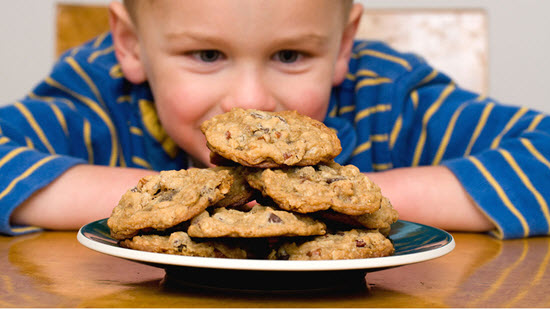
As a nutritionist who coaches many clients with sugar addiction, I find myself talking about willpower frequently and thinking about it a lot.
I used to take a hard line against willpower — or rather, against people”™s view of it. On behalf of my clients, I resented those who smirked when the clients reacted to sugary temptations with vulnerability and conflict. “You don”™t have to eat it,” they would smirk. I”™m not a fan of smirking.
Time and again, I remind my clients of how misguided that smirking view of willpower is.
Would we tell a smoker who”™s trying to quit to carry a pack of cigarettes in her purse, and place a pack in the car, in the office and in every room of the house, just to prove she has willpower?
Would we tell someone who”™s trying to stop drinking to get a job in a bar or hang out with his drinking buddies while they party, just to prove he has willpower?
So why do we expect someone going for weight loss to sit in a room full of brownies and jellybeans and not take a bite?
If your goal is to lose weight, the only thing you have to do is lose weight. You don”™t have to show you”™re a tower of strength. Keep tempting foods out of the house so they don”™t challenge your willpower.
The tower-of-strength willpower view is misguided at best. It typically comes from people who don”™t understand sugar addiction or why someone may have trouble resisting sugar that”™s readily available.
But have you noticed a shift lately in the attitude toward willpower?
I remember motivating slogans. Things like, “Willpower is a muscle. The more you use it, the stronger it gets.” Things like, “Where there”™s a will, there”™s a won”™t.”
The slogans seem inspiring — but they can make someone feel like a failure for not exerting willpower in certain situations.
Willpower 2015[wlm_private 'PRO-Platinum|PRO-Monthly|PRO-Gratis|PRO-Seasonal|Platinum-trial|Monthly-trial|PRO-Military|30-Days-of-PRO|90 Day PRO|Stages-Instructor|Schwinn-Instructor|Instructor-Bonus|28 Day Challenge']
The new view of willpower is that it”™s finite, and actually in short supply. It”™s now considered a conscious state that”™s strong early in the day but diminishes as the day wears on. Apparently, it”™s not a muscle that strengthens with use. It runs out because of something called Decision-Making Fatigue.
The more decisions we have to make over the course of the day — choosing between a donut or egg whites for breakfast, skipping a muffin at the morning meeting, avoiding dessert at lunch, ignoring the tray of cookies in the snack room at 3:30 p.m. — the more difficult it becomes to say “no” when we get home at night.
So is willpower a lifestyle habit that can be developed and strengthened? Or is it a limited resource that has to be meted out and saved for the moments it really counts?
And I wonder whether the limited-willpower viewpoint reflects rising obesity rates. Is it an attempt to explain them?
I”™ll boldly go where no one seems to be going. Could this new Law of Diminishing Daily Willpower have anything to do with the fact that sugar is everywhere, and in everything?
Because sugar is everywhere, it”™s an external trigger, making us want the goodies we see or smell. Cinnabon, anyone?
Because sugar”™s hidden in everything, it”™s an internal trigger, changing brain chemistry and priming us to eat more.
If sugar didn”™t run our food industry, maybe we”™d have stuck with the old view of willpower. It was around for a long time. I recall hearing those “inspiring” sayings before the obesity epidemic.
Maybe sugar is the reason for diminishing willpower — and the change in viewpoint about it.
Maybe. But I still say you don”™t have to prove you”™re a tower of willpower to get your nutrition goals. Set things up so you can win and just get them.[/wlm_private]
- Motivation vs. Enthusiasm - December 29, 2025
- Focus - August 16, 2025
- Raw Food Diets: How Good Are They For Us? - March 17, 2025
